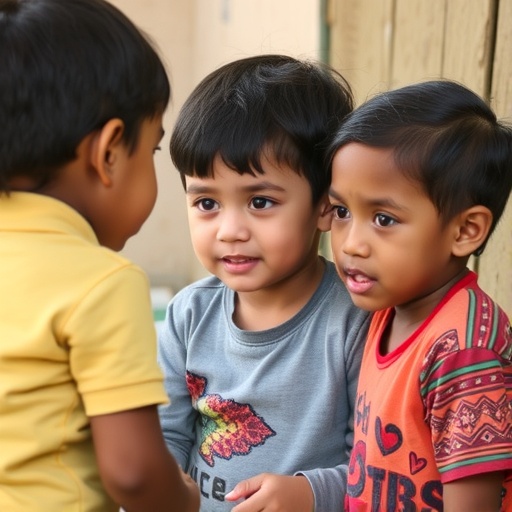In the rural expanses of South Africa’s Western Cape, a groundbreaking study is shedding light on the feasibility of community-based screening for neurodevelopmental disorders among pre-school children. This research emerges against a backdrop of significant public health gaps, where no standardized screening exists for early identification of developmental challenges in young children. The implications of such work resonate far beyond the local context, offering a pragmatic blueprint for similarly under-resourced regions worldwide grappling with early childhood health inequities.
Central to this study is the adoption and evaluation of a two-tiered screening strategy utilizing the ESSENCE-Q, a brief neurodevelopmental questionnaire. What sets this research apart is not just the tool itself but the innovative methodology of verbal administration to mothers by trained research assistants without professional health qualifications. This approach was carefully designed to navigate the complex socio-cultural and educational landscape typical of the rural Western Cape, addressing challenges of literacy and access head-on.
The translation of the ESSENCE-Q into Afrikaans and isiXhosa — the predominant local languages — underscores the importance of linguistic and cultural contextualization in neurodevelopmental screening. This deliberate adaptation ensured that the screening was accessible, comprehensible, and culturally sensitive, facilitating more accurate reporting by caregivers. The verbal administration method also circumvented the limitations presented by low literacy levels, providing mothers with a supportive and interactive environment to engage with the screening process.
A particularly compelling aspect of the research was the integration of qualitative data through a focus group with the research assistants administering the tool. Their insights unveiled a nuanced tapestry of logistical hurdles, including resource limitations and emotional trauma prevalent in the communities. Despite these barriers, the overwhelmingly positive reception by mothers points to a latent demand for such health initiatives, reinforcing the value of community engagement and trust-building in rural health strategies.
One of the key findings highlights the necessity of time-intensive clarification during the screening, as many mothers encountered difficulty grasping some child development concepts. This discovery calls for a tailored administration style that is flexible and patient, prioritizing understanding over efficiency. The study further innovated through the use of a visual consent booklet, enhancing informed consent processes by simplifying complex information into accessible formats, a practice that could serve as a model in other health screenings.
The research team’s field notes offer a candid reflection on feasibility, juxtaposing the enthusiasm of community participants with stark realities of resource scarcity and psychological trauma. Through detailed analysis, the study posits that with appropriate neurodevelopmental training and trauma-informed support for administrators, community screening can be both viable and sustainable. This recommendation is significant for policymakers and health planners striving to optimize limited health infrastructures.
Equally critical is the emphasis on ongoing support — not only for the mother-child pairs undergoing screening but also for those delivering the service. The mental and emotional toll on community screeners, who often lack formal health qualifications but are deeply embedded in the local fabric, requires structured supervision and psychological support systems to prevent burnout and ensure quality.
The research’s multifaceted approach — combining quantitative screening data with qualitative insights and mother feedback — presents a robust evidence base supporting pragmatic adaptations. These include flexible timing, culturally respectful communication, and visual aids. Importantly, the study acknowledges that unavoidable delays between screening and feedback could skew mother feedback, introducing a variable that future implementations should account for to optimize responsiveness.
Furthermore, the work advocates for intensive preparatory phases ahead of screening rollout. Engaging broad community-based stakeholders early on is crucial to foster ownership, reduce stigma, and tailor screening tools to local idioms and perceptions of child development. Such consultation ensures that interventions resonate authentically within their social contexts, enhancing both participation and impact.
The broader implications of this South African study are profound. It demonstrates that despite infrastructural constraints, it is possible to implement early neurodevelopmental screening that is community-embedded, respectful, and effective. The model could catalyze a paradigm shift in global health, redefining how neurodevelopmental disorders are detected and addressed in marginalized populations.
Ultimately, the study’s findings advocate for systematic incorporation of neurodevelopmental screening into public health agendas coupled with strategic investments into training, supervision, and psychological support systems. This integrated approach is essential to safeguard early childhood development and lay foundations for healthier futures where socioeconomic and geographic barriers do not dictate developmental outcomes.
As researchers and practitioners digest these insights, the hope is that the ripples from this rural Western Cape initiative will energize global efforts aimed at bridging healthcare divides. The feasibility uncovered here ignites potential for expansive, culturally informed, and sustainable screening programs that elevate the health trajectories of millions of children who currently remain invisible to early intervention services.
Subject of Research: Feasibility of community-based neurodevelopmental screening for pre-school children in rural Western Cape, South Africa
Article Title: Neurodevelopmental problems in pre-school children in rural Western Cape, South Africa: is community screening feasible?
Article References:
Truter, B., Gillberg, C., Slogrove, A.L. et al. Neurodevelopmental problems in pre-school children in rural Western Cape, South Africa: is community screening feasible? BMC Psychiatry 25, 348 (2025). https://doi.org/10.1186/s12888-025-06791-7
Image Credits: AI Generated




